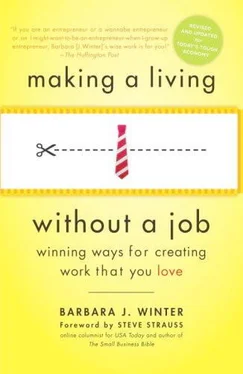For the first century or so of our history, self-employment flourished. At the beginning of the twentieth century, nine out of ten Americans worked for themselves. The economic freedom and civil harmony predicted by those early patriots prevailed.
Then, around 1900, the tide began to turn. The Industrial Revolution needed workers, and people flocked to jobs in plants and factories. With each passing decade, fewer and fewer of us exercised the option to build something of our own. The effect of this was stunning. Before long, few of us believed that it was possible to work independently. We became dependent on others, looking outside ourselves for support and validation. An employer or union or, surely, the government would take care of us.
We are now living with the consequences of that thinking. Economic hardship and civil unrest have become the top stories on the nightly news. Today, nine out of ten of us who work labor in someone else’s fields. While there’s a general consensus that change is needed, widespread solutions are in short supply.
There is an option that can make a difference—and a profound difference at that. It’s not dependent on any political backing, nor does it require that society fix itself at once. It’s an option that’s available whether the economy improves or it doesn’t. You can exercise this option without enormous amounts of capital, although it will require heavy doses of action and imagination. You may have to change your thinking and challenge your self-imposed limitations. I promise you, however, that you do have the equipment you need for becoming joyfully jobless. The only question remaining is this: Do you have the desire?
Taking Another Look at Work
Most of us have gotten precious little guidance in selecting our life’s work. While we giggle at the famous scene in the movie The Graduate where Dustin Hoffman is counseled to make his future in plastics, many of us came to our careers because of equally foolish advice. Entering a profession because it looks promising or secure is the ultimate crapshoot. My classes are filled with folks who spend their days miserably sitting at computers because they were urged to get into that growing field. Their personal skills and passions were ignored or devalued.
Even more damaging to our vocational development is the belief that work is nothing more than a way to earn money. Why should we commit a third—or more—of our time to doing something that we don’t care about? Why can’t we get paid for being happy?
My friend Ruth attended a jazz concert at the Metropolitan Museum of Art in New York. After several pieces had been played, pianist Billy Taylor announced that the band would take a break and entertain questions from the audience. Several people asked technical questions of the musicians, and then Ruth raised her hand and asked, “I know how I feel listening to your music, but what I want to know is how you feel when you’re playing. What do you feel when you finish an evening like this?” At first, the musicians were a bit uncomfortable with the rather intimate question, but once they began talking about their feelings, their passion for making music, they shared their immense joy about their chosen profession. When the evening ended, they individually sought Ruth out and thanked her for asking the question. One of them admitted feeling somewhat embarrassed talking about his pleasure when he knew that most of his audience worked at things that brought them no joy whatsoever.
How could we have gotten it so wrong all this time, thinking that money was adequate compensation for doing work that we loathed—or, at least, cared little about? What if we began to expect from our work high levels of satisfaction? What if we refused to have less than that? And what if we believed that our work was one part of a grander goal?
In 1966, Rohn and Jeri Engh settled on a 100-acre farm in Osceola, Wisconsin. Their goal was “to make a life, not just a living.” They have managed to do both, and today their barn serves as the headquarters for their growing international business.
At first the Enghs freelanced articles and photographs for national magazines and textbook companies. Then Rohn got the idea that was the beginning of PhotoSource International. He started a newsletter that served as a clearinghouse between editors and photographers. With time and technology, that newsletter has grown into several newsletters, including an electronic one. In addition, Rohn conducts seminars for photographers, both in Wisconsin and around the country.
Talking to him, you get the impression that he’s as proud of his unique lifestyle as he is of his business. “I’ve never considered what I do work, and I don’t relate to city people who are fond of muttering, ‘TGIF.’ Often I don’t know if it’s Wednesday, Friday, or Monday. I don’t even own a watch. We get up whenever we want to—usually at dawn. We never keep track of time. I don’t even know how old I am.”
What strikes me about Rohn Engh’s philosophy is a desire he shares with other self-bossers to make a life, not just a living. Paul Hawken, the author of Growing a Business , reaffirms this notion when he says, “Being in business is not about making money. It is a way to become who you are.” It’s this grander concept of the purpose of work in our lives that’s leading so many to seek alternatives.
Have I become the person that I want to be, we wonder, and if not, is it too late? We begin questioning our choices and asking new questions of ourselves. Have I followed my dreams? Lived as I wanted? Exercised my creative spirit? Lived my values? Built something of my own? Made my children proud? Thought my own thoughts? Acted with courage and magnificence?
Questions like these (and my uncomfortable answers) forced me to shift gears and take another look at my life and my work. Let me tell you how I got here. It’s a tale of trial and error.
Getting Off the Beaten Path
The small town in southern Minnesota where I grew up is the sort of place that is charming when Garrison Keillor talks about it but stifling when you live there. Even as a kid, I knew that the people around me were leading humdrum lives. I vowed not to follow in their footsteps. Thanks to my love of reading, I had discovered that another world existed that was far more exciting than the one I saw around me. I spent hours daydreaming about glamorous careers, exotic travel, and sophisticated friends. By the time I reached high school, my mother would regularly ask, “What are you going to be this week?” I always had a fresh answer.
My dreams faded quickly when I followed my peers off to college and was advised to make sensible plans. I entered college not knowing what I wanted to do, and when I graduated I wasn’t much clearer. However, I now had a diploma that authorized me to teach high school English and speech. Off I went to do just that in another tiny community near my hometown.
My teaching career began with great enthusiasm. Having had a lifelong love affair with all things British, I was certain I could share my passion for English literature with adolescents who didn’t know what they were missing. The first two years turned out to be enormous fun as I grew confident in my ability to motivate and inspire unruly teenagers. By my third year, things began to change and I found myself saying, “The nice thing about teaching is that you get a lot of time off.” I was also bumping heads too frequently with an administration who wished I’d just stick to the syllabus and not spice things up.
In my fourth year came what I now think of as My Horrible Moment of Truth, when I realized that I could predict with absolute certainty where I was going to be and what I was going to be doing every hour of every day of the year. I was doomed to go through life saying, “If this is March, it must be Macbeth. ” It was a terrifying prospect.
Читать дальше












